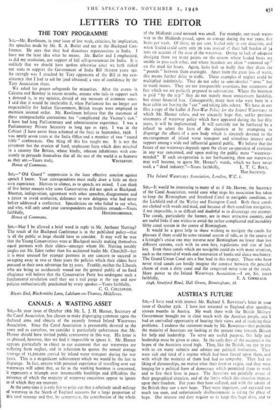CANALS : A WASTING ASSET
SIR,—In your issue of October 18th Mr. L. J. H. Horner, Secretary of the Canal Association, has chosen to make disparaging comment upon the declared aims and objects of the recently formed Inland Waterways Association. Since the Canal Association is presumably devoted to the same end as ourselves, we consider it particularly unfortunate that Mr. Horner should have invited public controversy in this way. His letter is so phrased, however, that we find it impossible to ignore it. Mr. Homer appears particularly to object to cur statement that our waterways are suffering from neglect, and in refutation he quotes the annual average tonnage of 11,200,000 carried by inland water transport during the war years. This is a magnificent achievement which we would be the last to disparage. In fact, anyone with personal experience of travelling over our waterways will admit that, so far as the working boatman is concerned, it represents a triumph over innumerable hardships and difficulties the existence of which the majority of waterway executives appear to ignore or of which they are unaware.
At the same time it is only fair to point cut that a relatively small mileage of waterway in the North of England accounts for a large proportion of this total tonnage and that, by comparison, the contribution of the whole
of the Midlands canal network was small. For example, one trunk water- way in the Midlands passed, upon an average during the war years, five boats per week. Of these, 90 per cent. leaded only in one direction, and when loaded cculd carry only 26 tons instead cf their full burden of 34 tons on account cf the state of the waterway. Owing to lack of adequate dredging there are many points on the system where loaded boats are unable to pass each other, and where boatmen are often " stemmed up " cn the mud fcr hours. Again, locks leak so badly that they drain the " pounds " between them overnight. Apart from the great loss of water, this means further delay to traffic. These examples of neglect could be multiplied indefinitely. They do not refer to semi-derelict " arms " but to trunk routes. They are not irresponsible assertions, but statements of fact which we are perfectly prepared to substantiate. Where the boatman is paid " by the trip " they do not merely mean unnecessary hardship, but direct financial less. Consequently, many men who were born in a beat cabin are leaving the "cut" and taking jobs ashore. We have in our files a copy of the leaflet A Post-War Policy for the Inland Waterways to which Mr. Homer refers, and we sincerely hope that, unlike previous statements of waterway policy which have appeared during the last fifty years, it will be implemented. It will certainly not be furthered by a refusal to admit the facts of the situation or by attempting to disparage the efforts of a new body which is sincerely devoted to the encouragement of inland water transport and stimulates interest and support among a wide and influential general public. We believe that the future cf our waterways depends upon the closer co-operation of everyone in any way concerned, and upon making the public more " waterway- minded." If such co-operation is not forthcoming, then our waterways may well become, to quote Mr. Homer's words, which we have never used, a " dead industry."—Yours faithfully, L. T. C. ROLT,
Hon Secretary.
The Inland Waterways Association, London, W.C. z.


































 Previous page
Previous page